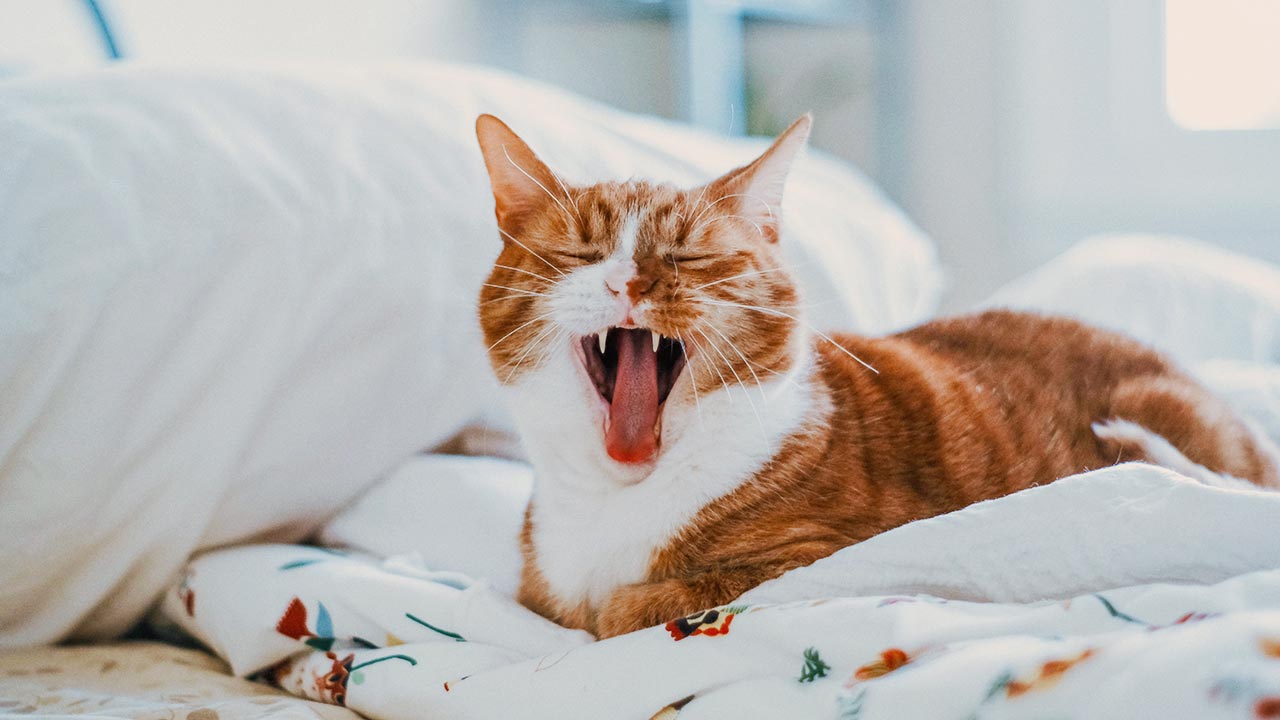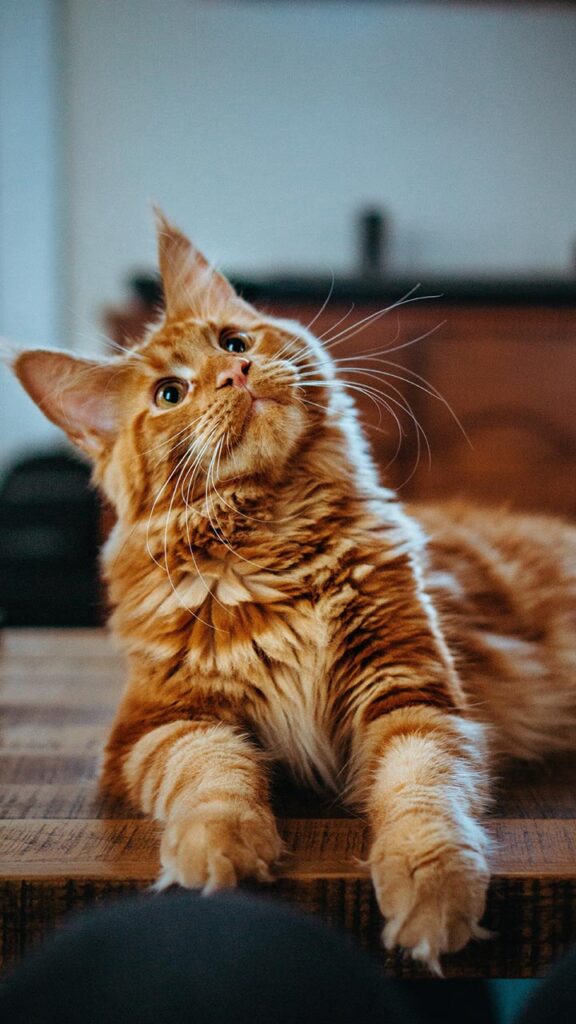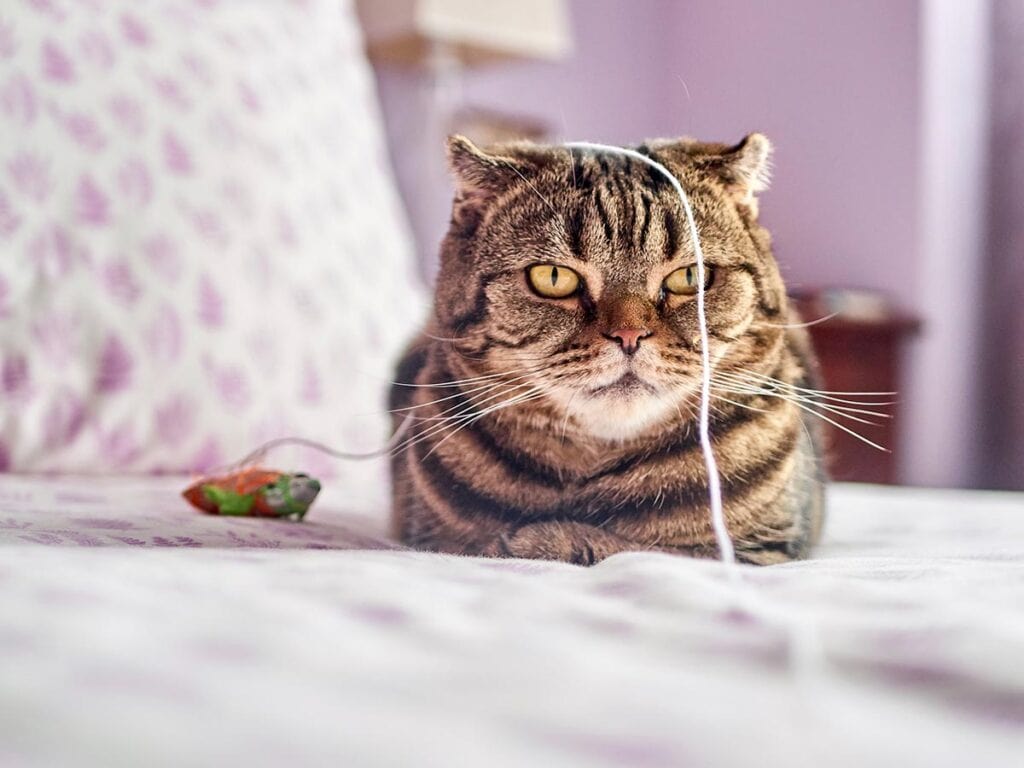What Can You Do If Your Cat Won’t Let You Sleep Through The Night?
Written by
Michael Levin
Medically reviewed by
Erica Irish
Summarize

Cats are exciting animals who do what they want and when they want to do it. Their independent attitude is precisely why some people adore their cat. Still, that independence can be annoying when it means your cat insists on playing in the middle of the night or persistently wakes you up at 4 AM.
Cats are crepuscular, meaning they are most active at dawn and dusk, harkening to the fact that their internal clocks are set to catch their favorite prey – mice and birds. They also follow a polyphasic sleep pattern, which means they sleep periodically throughout the day. These behavioral characteristics frequently add up to a cat taking multiple naps throughout the day, being ready to play when it is time to head to bed, sleeping only a handful of hours in the middle of the night, waking up periodically prepared to play again and getting up before sunrise.
Your cat is happy, and you are exhausted. What is the best strategy for dealing with nocturnal cat behavior? There are many approaches, including changing playtime routines and using CBD oil for cats at night.

TL;DR (Too Long; Didn’t Read):
Due to instincts and other facts like age and feeding habits, cats are notorious for not letting their owners sleep through the night. Cats and humans have different sleep cycles, and they may clash. Some recommendations to encourage a cat to sleep through the night include adding a play time session before bedtime, feeding the cat closer to bedtime and using CBD at night to calm cats. There is a choice of CBD oil for cats and CBD treats for cats.
Table of Contents
Reasons Your Cat Wakes You Up at Night
Experts recommend adults get seven hours of sleep each night to minimize the risk of developing health issues related to inadequate sleep. Try telling that to your energetic cat! Managing sleep with active cats is challenging because you cannot order your cat to bed.
The average cat nap during the day is 78 minutes, but naps can range from 50-113 minutes. Their circadian rhythms differ from human ones, so they may not mix. A research study on the relationship of human sleep and cat ownership found that owning a cat increased the odds of being unable to sleep seven hours each night.
Why do cats play at night? Besides their natural sleep cycle, there are many possible reasons a cat keeps you from falling asleep, waking you up in the middle of the night or too early.
- Naturally excessively energetic either due to biology or because the cat is young.
- Gets hungry in the middle of the night and demands you fill the bowl.
- Wants to snuggle because it is very affectionate.
- Does not get enough daytime activity, like playtime.
- Oversleeps during the day out of boredom.
- A medical condition causes sleeplessness.
- Something has caused discomfort like the cat’s favorite napping spot or bedding being changed.
- Aging leads to feline cognitive dysfunction syndrome not associated with a medical condition but increases day and nighttime vocalization due to some disorientation.
Of course, you might be a restless sleeper and wake the cat up tossing and turning. Once awake, the cat wants attention and insists on getting it. There is little hope of going back to sleep.
What to Try if Your Cat is Very Active at Night
You can take several steps to encourage your active cat to sleep. Choosing the right approach depends on what is influencing your cat’s nighttime habits. For example, is it a medical condition or just too much energy?
Some things you try will require patience because changing behavior takes time. Also, some suggestions require you to change your behavior to change the cat’s behavior. You may also have to try different approaches depending on the cat’s age. A kitten is easier to train than an older cat with a routine.
- Play with your cat for an hour before bedtime with laser light and toys to chase.
- Try ignoring your cat when the cat tries to wake you up (though it is hard to ignore a demanding cat).
- Do not let the cat sleep in your bedroom by closing the door at bedtime and setting up a cozy separate sleeping space somewhere else in the residence; some people give their cat its room with a place to sleep and litter boxes.
- Split the regular evening feeding into two feeding periods, with one close to bedtime.
- Use an automatic feeder that is set to release some food in the morning.
- Add more daytime opportunities for your cat to play, like scratching boards, climbing scratching posts and an outdoor enclosure.
- Play with your cat throughout the day, if possible, instead of letting the cat sleep most of the day.
- If a medical issue is suspected, have a veterinarian check your cat for a condition causing discomfort.
- Melatonin, designed for cats, might help your pet sleep through the night.
- Try using CBD to calm cats at night.

Changing a cat’s behavior is difficult because they are so independent and usually particular. Though melatonin for cats may work a few nights, the felines might be immune to its effects after a few days. In addition, some cats may be allergic to melatonin, experience side effects or take veterinarian-prescribed medications that should not be mixed with melatonin. Also, melatonin should not be given to cats under a year old.
A research study on increasing doses of CBD oil to 30.5 mg/kg found CBD was safe for cats. However, it was a safety study, and a purposefully high dose was given. We want to emphasize that 30.5 mg/kg is probably not ideal.
A different study investigated the effects of CBD on a 10-year-old cat with chronic discomfort in joints. After 30 days of taking full spectrum CBD oil, the level of chronic discomfort decreased by 50%. Like humans, discomfort frequently disrupts sleep. Reduce it, and sleep improves.
Using CBD Oil for Your Cats
There are two types of CBD remedies for cats’ sleep disruption: CBD oils and treats. Cats have an endocannabinoid system, so there are potential benefits similar to the benefits humans experience. CBD may calm cats and promote general wellness.
More research is needed, so it is important to administer CBD oil or other products based on the serving size. If CBD oil says a serving size is 0.5 ml, you can administer it in one dose or split the dose into half servings. You want to give your cat the same amount of CBD on a schedule until you feel comfortable about the effects.
There are several ways to administer CBD for cats.
- Add drops of CBD oil to food or cat treats.
- Administer drops of CBD oil in the mouth.
- Rub oil on the cat’s gums (watch out for sharp teeth!).
- Mix oil with tuna juice or a fish oil your cat loves.
Another one of the CBD products for cats’ nighttime restlessness is cat treats. They are tasty treats infused with CBD that are formulated to address different issues, including reducing discomfort, supporting joints and promoting wellness. The CBD package may recommend the number of treats to give your cat based on weight. After you ensure your cat enjoys the treats and experience the benefits, you can adjust the servings as necessary.
FAQs
There are different ways to train your cat to sleep at night. They include keeping your cat out of your bedroom at night, feeding your cat close to bedtime and then at a preferred morning time and consistently ignoring your cat when your pet wakes you up until the cat learns you are not getting up.
Yes, changing a cat’s daytime routine may improve night sleeping habits. Cats may wake up in the middle of the night for several reasons. One is the cat is sleeping too much during the day and not getting any exercise through playtime. Add some toys and scratching pads and posts the cat can use. You can also change the feeding schedule so the cat gets dinner closer to bedtime. This may prevent a cat from getting hungry during the night.
Changing a daytime routine can also be related to changing the nighttime routine. If you keep your cat awake by going to bed later in the day, your cat may sleep through the night. The main point is that cats prefer routines, so you want to establish a routine that works for you and the cat.
It would be best to play with your cat before bedtime, but not in the bedroom. Play with the cat for 15-20 minutes before going to bed. Playtime is exercise time and triggers mental stimulation that can tire the cat somewhat. You can use a toy that mimics chasing prey.
Cats appear to understand when their owner is sleeping. Cat experts say this because cats seem to understand they must make an extra effort to get a sleeping human’s attention. It could be curling up by your face, playing with your fingers, licking your arm, scratching on the side of the mattress or standing in the bedroom and yowling.
Summary
How you react to your cat’s attempt plays a significant role in how your cat behaves. A routine is quickly established if you get up during the night or early in the morning because your cat wants you to. Cats are intelligent and quickly learn what works to get them their way. It will likely take a blend of approaches to get a good night’s sleep, including playing with your cat more often during the day and giving your cat CBD oil for cats at night.
Sources
- NHLBI, NIH. How Much Sleep Is Enough? Last updated on March 24, 2022.
- Sleep Foundation. How Long Do Cats Sleep? National Library of Medicine, Biotech Information.
- van Egmond LT, Titova OE, Lindberg E, Fall T, Benedict C. Association between pet ownership and sleep in the Swedish CArdioPulmonary bioImage Study (SCAPIS). Sci Rep. 2021; 11: 7468. Published online 2021 Apr 2. doi: 10.1038/s41598-021-87080-7. PMCID: PMC8018946. PMID: 33811252.
- Černá P, Gardiner H, Sordo L, Tørnqvist-Johnsen C, Gunn-Moore DA. Potential Causes of Increased Vocalisation in Elderly Cats with Cognitive Dysfunction Syndrome as Assessed by Their Owners. Animals (Basel). 2020 Jun; 10(6): 1092. Published online 2020 Jun 24. doi: 10.3390/ani10061092. PMCID: PMC7341261. PMID: 32599838.
- Kulpa JE, Paulionis LJ, Eglit GM, Vaughn DM. Safety and tolerability of escalating cannabinoid doses in healthy cats. J Feline Med Surg. 2021 Dec;23(12):1162-1175. doi: 10.1177/1098612X211004215. Epub 2021 Mar 26. PMID: 33769105; PMCID: PMC8637357.
- Gutierre E, Crosignani N, García-Carnelli C, di Mateo A, Recchi L. Case Reports Vet Med Sci. 2023 May;9(3):1021-1025. doi: 10.1002/vms3.1057. Epub 2023 Mar 31. PMID: 37002652; PMCID: PMC10188064.
Share this post







0